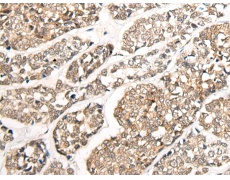中文名稱:兔抗CCDC181多克隆抗體
英文名稱: Anti-CCDC181 rabbit polyclonal antibody
別 名: C1orf114
儲 存: 冷凍(-20℃)
抗 原: CCDC181
相關類別: 一抗
標 記 物: Unconjugate
克隆類型: rabbit polyclonal
技術規(guī)格
|
Background: |
CCDC181, also known as C1orf114, chromosome 1 is the largest human chromosome spanning about 260 million base pairs and making up 8% of the human genome. There are about 3,000 genes on chromosome 1, and considering the great number of genes there are also a large number of diseases associated with chromosome 1. Notably, the rare aging disease Hutchinson-Gilford progeria is associated with the LMNA gene which encodes lamin A. When defective, the LMNA gene product can build up in the nucleus and cause characteristic nuclear blebs. The mechanism of rapidly enhanced aging is unclear and is a topic of continuing exploration. The MUTYH gene is located on chromosome 1 and is partially responsible for familial adenomatous polyposis. Stickler syndrome, Parkinsons, Gaucher disease and Usher syndrome are also associated with chromosome 1. A breakpoint has been identified in 1q which disrupts the DISC1 gene and is linked to schizophrenia. Aberrations in chromosome 1 are found in a variety of cancers including head and neck cancer, malignant melanoma and multiple myeloma. The C1orf114 gene product has been provisionally designated C1orf114 pending further characterization. |
|
Applications: |
ELISA, IHC |
|
Name of antibody: |
CCDC181 |
|
Immunogen: |
Fusion protein of human CCDC181 |
|
Full name: |
coiled-coil domain containing 181 |
|
Synonyms: |
C1orf114 |
|
SwissProt: |
Q5TID7 |
|
ELISA Recommended dilution: |
5000-10000 |
|
IHC positive control: |
Human lung cancer and human esophagus cancer |
|
IHC Recommend dilution: |
40-200 |


 購物車
購物車 幫助
幫助
 021-54845833/15800441009
021-54845833/15800441009

